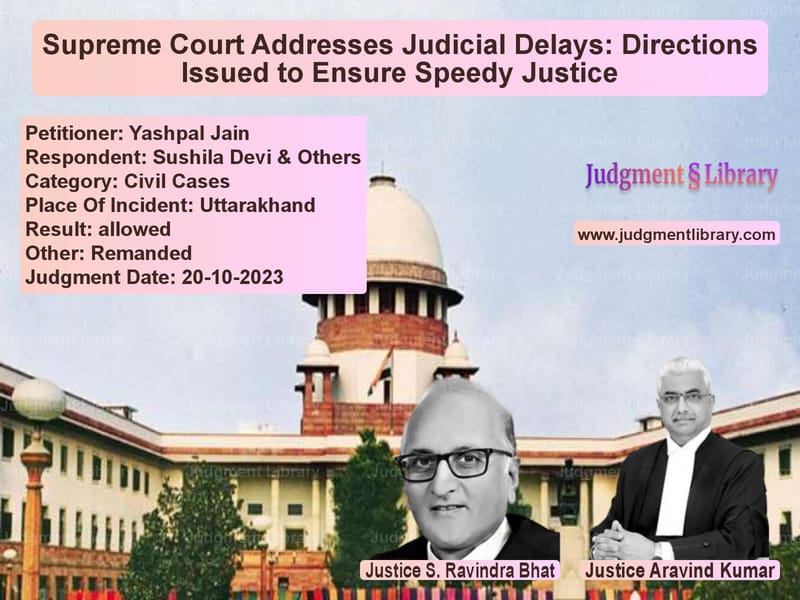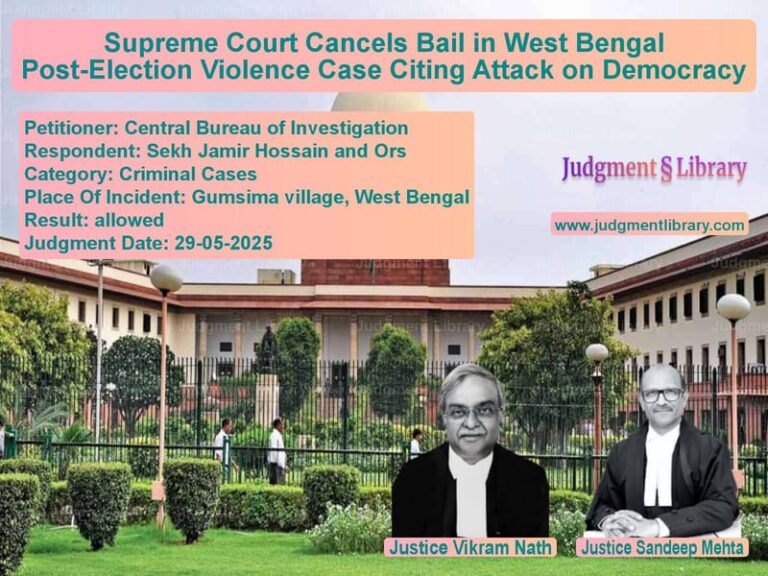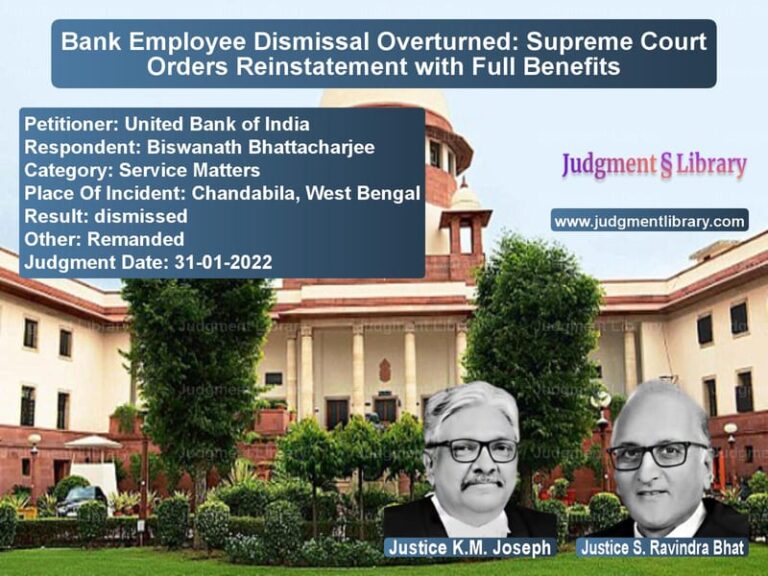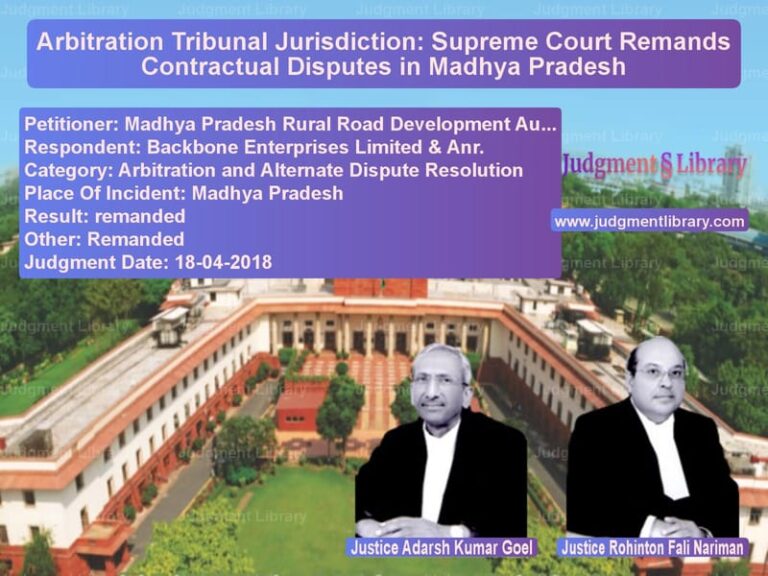Supreme Court Addresses Judicial Delays: Directions Issued to Ensure Speedy Justice
The Supreme Court of India has issued a landmark judgment in the case of Yashpal Jain v. Sushila Devi & Others, shedding light on the longstanding issue of judicial delays and inefficiencies in the Indian legal system. This case, which has been pending for 41 years, became the basis for the Court to introduce crucial directives aimed at expediting the legal process and ensuring that litigants do not suffer due to procedural inefficiencies.
Background of the Case
The case pertains to a civil suit filed in 1982, OS No.2 of 1982, seeking to declare a sale deed executed by Mangal Singh in favor of several defendants null and void. The plaintiff, Urmila Devi, claimed ownership of the disputed properties and sought possession. However, her death in 2007 led to a protracted legal battle over her legal representation in the ongoing suit.
Several claimants, including Manoj Kumar Jain and the appellant, Yashpal Jain, asserted their rights to be substituted as her legal representative. The dispute revolved around competing claims based on an alleged adoption deed from 1973 and a registered will from 1999.
Key Legal Issues
- Whether the appellant, Yashpal Jain, should be substituted as the legal representative of Urmila Devi.
- The legal validity of the adoption deed versus the registered will.
- The broader issue of excessive judicial delays and its impact on litigants.
Arguments by the Petitioner (Yashpal Jain)
The petitioner contended:
- The trial court and revisional court had both allowed his substitution as the legal representative of Urmila Devi, but the High Court overturned this decision.
- The defendants had previously acknowledged him as Urmila Devi’s legal representative in other proceedings and could not take a contradictory stand in this case.
- The High Court’s decision failed to consider the evidence supporting his claim, including the adoption deed.
Arguments by the Respondents
The respondents, primarily the legal heirs of Mangal Singh, argued:
- The appellant had initially supported the claim of Manoj Kumar Jain based on the 1999 will and later reversed his stance.
- The appellant had failed to take timely action, leading to the abatement of the suit.
- The High Court was correct in restoring the trial court’s initial decision, which had allowed the substitution of Manoj Kumar Jain.
Supreme Court’s Observations
The Supreme Court took note of the protracted litigation and the inefficiencies that had led to a delay of over four decades. The Court remarked:
“Even after 41 years, the parties to this lis are still groping in the dark and litigating as to who should be brought on record as legal representative.”
The Court emphasized that procedural delays erode public confidence in the judiciary and hinder access to justice.
On Judicial Delays
The Court extensively discussed the broader issue of judicial delays, referencing data from the National Judicial Data Grid (NJDG). It highlighted that millions of cases remain pending for decades, leading to a loss of faith in the legal system.
On Case Management
The judgment stressed the need for a structured approach to case management, urging trial courts to adhere to strict timelines. The Court noted:
“Adjournments are granted as a matter of course, without sufficient cause. This practice must be curtailed to ensure speedy trials.”
On Procedural Reforms
The Court reviewed past recommendations for legal reforms, including those by the Law Commission of India and the Malimath Committee. It underscored the importance of implementing existing procedural safeguards under the Civil Procedure Code (CPC) and the Criminal Procedure Code (CrPC).
Supreme Court’s Final Orders
The Court allowed the appeal, setting aside the High Court’s order and restoring the decision of the trial court and revisional court, thereby allowing Yashpal Jain to be substituted as Urmila Devi’s legal representative.
Additionally, the Court issued a series of directives to improve judicial efficiency:
- Strict Adherence to Case Timelines: Trial courts must ensure that cases do not remain pending indefinitely.
- Day-to-Day Trial Proceedings: Once a trial begins, it must proceed on a daily basis until completion.
- Limited Adjournments: Adjournments should be restricted to a maximum of three per party, except in exceptional circumstances.
- Summons and Written Statements: Courts must ensure that summons are served promptly and written statements are filed within the prescribed timeframe.
- Accountability of Judicial Officers: Judges must take proactive measures to prevent unnecessary delays.
Impact of the Judgment
This ruling is expected to have far-reaching implications for judicial administration in India. By emphasizing procedural discipline and discouraging frivolous adjournments, the Court has set a precedent for expediting pending cases.
The judgment also serves as a warning to litigants and legal professionals who exploit procedural loopholes to delay justice. The Court’s strong stance on case management underscores its commitment to ensuring a more efficient and responsive judiciary.
Conclusion
The Supreme Court’s intervention in this case goes beyond the individual dispute and addresses systemic issues plaguing the Indian judiciary. By setting clear guidelines for case management and holding stakeholders accountable, the judgment paves the way for a more effective legal system.
The directives issued by the Court, if implemented effectively, could significantly reduce case backlog and restore public faith in the justice delivery system.
Petitioner Name: Yashpal Jain.Respondent Name: Sushila Devi & Others.Judgment By: Justice S. Ravindra Bhat, Justice Aravind Kumar.Place Of Incident: Uttarakhand.Judgment Date: 20-10-2023.
Don’t miss out on the full details! Download the complete judgment in PDF format below and gain valuable insights instantly!
Download Judgment: yashpal-jain-vs-sushila-devi-&-other-supreme-court-of-india-judgment-dated-20-10-2023.pdf
Directly Download Judgment: Directly download this Judgment
See all petitions in Legal Malpractice
See all petitions in Property Disputes
See all petitions in Succession and Wills
See all petitions in Contract Disputes
See all petitions in Damages and Compensation
See all petitions in Judgment by S Ravindra Bhat
See all petitions in Judgment by Aravind Kumar
See all petitions in allowed
See all petitions in Remanded
See all petitions in supreme court of India judgments October 2023
See all petitions in 2023 judgments
See all posts in Civil Cases Category
See all allowed petitions in Civil Cases Category
See all Dismissed petitions in Civil Cases Category
See all partially allowed petitions in Civil Cases Category







